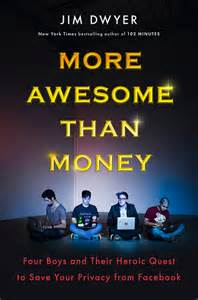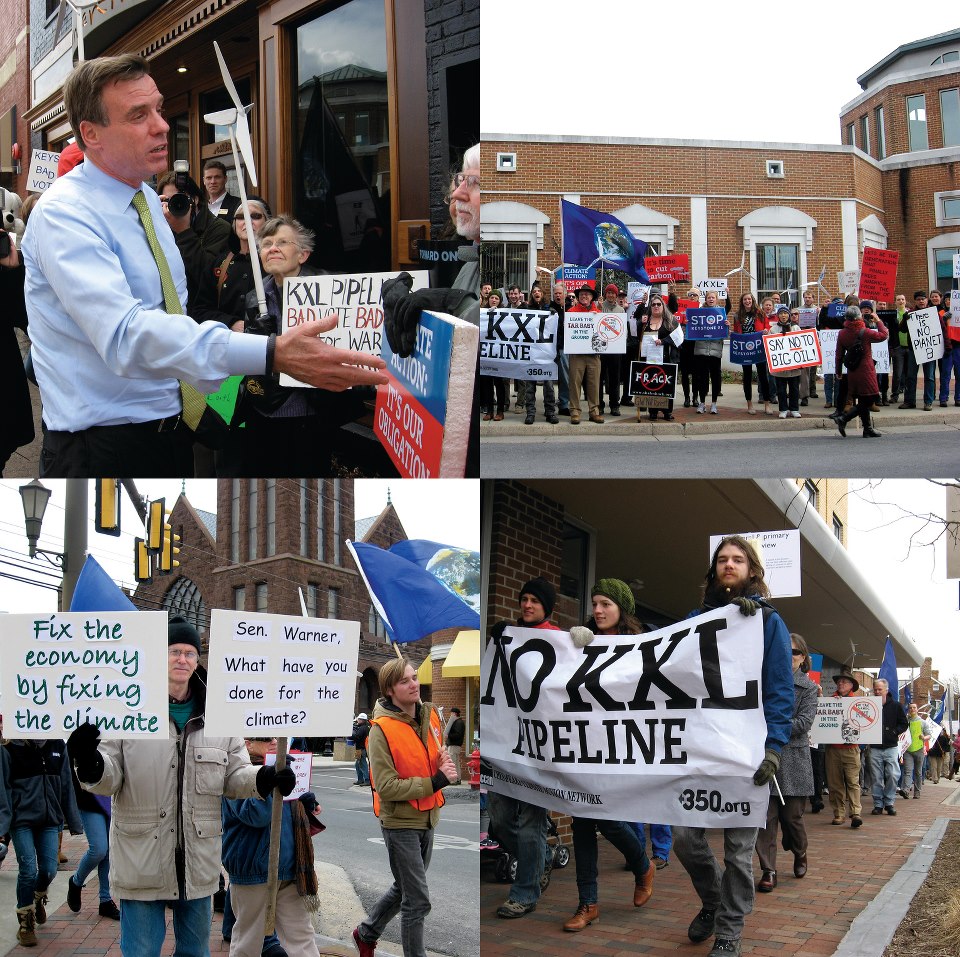 I just finished reading the fascinating new book More Awesome Than Money: Four Boys and Their Heroic Quest to Save Your Privacy from Facebook by Pulitzer Prize winner and New York Times reporter Jim Dwyer. The Wall Street Journal describes the book as the efforts of “four idealists frustrated with Facebook’s control over our personal data…to create an alternative,” and why they didn’t ultimately succeed. Other than being a fascinating story, with drama and even tragedy (specifically, the suicide of brilliant, charismatic co-founder Ilya Zhitomirskiy), the book covers important issues facing all of us in the age of social media, the “cloud,” etc.: privacy, the digital “Panopticon,” the profit motive vs. creating something socially beneficial, how promising technologies do or don’t end up getting funding to move forward, implications for society, even human identity itself. I make absolutely no pretensions to being an expert on any of this, just someone interested in the subject. So, I asked my friend Yosem Companys — who teaches high-technology entrepreneurship at Stanford University, runs social media for Stanford’s Program on Liberation Technology, and previously worked as consiglieri and CEO of Diaspora (with a crucial role to play in “More Awesome than Money”) – whether he would be willing to answer a few questions. He graciously agreed. Here’s the interview, edited for conciseness and clarity. Note: I’ve decided, due to the interview’s length (16 questions and answers), to break it up into four parts. The first four questions and answers are available here. Now, here are #5-#8.
I just finished reading the fascinating new book More Awesome Than Money: Four Boys and Their Heroic Quest to Save Your Privacy from Facebook by Pulitzer Prize winner and New York Times reporter Jim Dwyer. The Wall Street Journal describes the book as the efforts of “four idealists frustrated with Facebook’s control over our personal data…to create an alternative,” and why they didn’t ultimately succeed. Other than being a fascinating story, with drama and even tragedy (specifically, the suicide of brilliant, charismatic co-founder Ilya Zhitomirskiy), the book covers important issues facing all of us in the age of social media, the “cloud,” etc.: privacy, the digital “Panopticon,” the profit motive vs. creating something socially beneficial, how promising technologies do or don’t end up getting funding to move forward, implications for society, even human identity itself. I make absolutely no pretensions to being an expert on any of this, just someone interested in the subject. So, I asked my friend Yosem Companys — who teaches high-technology entrepreneurship at Stanford University, runs social media for Stanford’s Program on Liberation Technology, and previously worked as consiglieri and CEO of Diaspora (with a crucial role to play in “More Awesome than Money”) – whether he would be willing to answer a few questions. He graciously agreed. Here’s the interview, edited for conciseness and clarity. Note: I’ve decided, due to the interview’s length (16 questions and answers), to break it up into four parts. The first four questions and answers are available here. Now, here are #5-#8.
Question #5: So how did Diaspora ever think they could get masses of Facebook users to switch over to Diaspora, despite the fact that all their friends, family, and other contacts were at Facebook, not on Diaspora?
Yosem Companys: To the guys’ credit, they spent long hours trying to create their own network effect, spending time trying to build “killer apps.” Some of these apps, like cubbi.es, were extremely popular among our user base and did significantly increase engagement. But the guys initially spent little time thinking about how to overcome Facebook’s network effect. I did the opposite, by asking our users about what would make them stay on Diaspora. The market research suggested a dual strategy that I persuaded the guys to pursue.
First, Diaspora would be like Hootsuite, allowing you to post and receive messages from “public” networks such as Twitter and Facebook, while still affording you the possibility of posting and receiving “private” messages through Diaspora.
Second, Diaspora would present itself as a network for discovering people you don’t know, something that made sense because the network effect is rendered irrelevant if your user base consists of people who want to meet interesting alters rather than hanging out with their friends. The first allowed Diaspora users to remain connected with their friends so they felt comfortable enough to do the second, i.e., make new friends.
 Question #6: So why did this strategy fail?
Question #6: So why did this strategy fail?
Yosem Companys: I don’t think it failed. The data suggests the strategy is still an effective one. The problem was with the execution of the strategy, because Diaspora, unfortunately, suffered from what some in the study of organizations have dubbed “organizational schizophrenia”. That’s a phenomenon characterized by impulsive behavior, mixed messages, and lack of a commitment to promising strategies. The guys would fully commit to following the strategy and business model but then back away and try something else. As the academic literature on organizations shows, experimentation, or “morphing,” is important in entrepreneurship given the high degree of uncertainty. However, given the limited resources of a startup, the process has to be focused and ideas must be appropriately tested and fleshed out before moving to the next ones. But this is an area where the guys struggled, most likely due to their entrepreneurial inexperience.
For example, even though we had the data suggesting that we had found a profitable business model; that venture capitalists were interested in once they saw the data; and that the guys had committed to pursuing it; they would back away and want to try something else.
Similarly, the guys would not fully commit to building the HootSuite-like capability that users asked for. Instead, they opted to focus on exploring killer apps, wanting Diaspora to be both a place for hanging out with existing friends AND meeting new ones. That’s something the market research had shown was somewhat contradictory.
In a more inadvertent case, the decision by the guys not to start with the business model of providing personal servers from the very beginning sent mixed messages to users. By creating their own centralized server and, as in the example above of a family server, admitting thousands of alpha users through this server, it made it quite difficult for the guys to explain the decentralized approach to media outlets and investors. Why? Because it was difficult for external observers to distinguish between that centralized server and the decentralized ecosystem of servers as a whole. This led to considerable confusion among users, as Diaspora sometimes presented itself as a centralized model, other times as a decentralized one.
Ultimately, the guys’ pursuit of a killer app killed the Diaspora star, you could say. It did not, however, kill Diaspora itself, as that still exists and continues to grow. But it did lead the guys to devote more time to developing little apps that were basically plug-ins to Diaspora, rather than to developing the core of Diaspora itself. (Remember, we’re talking about four guys coding a network for hundreds of thousands of users, so coding one thing necessarily entails the opportunity cost of not coding something else.) Ultimately, the guys went to Y-combinator to develop one of these killer apps, made it a free-standing app independent of Diaspora, and quit coding on Diaspora altogether.
Question #7: So, based on what we’ve discussed so far, would it be fair to say that there are inherent problems with the centralized and/or for-profit model of social networking? Are there plausible alternatives?
Yosem Companys: The problem with the centralized model is that the employees of the supposedly privacy-friendly startup could read all of your messages, whether private or not, because they run the server on which your data resides. So, there is an issue of trust, and there is no technical way that you can control your data under those circumstances, unless you encrypt everything. But then, that would slow the server down significantly, which can worsen the user experience. Without full encryption, the only difference between a centralized site with a privacy promise on the one hand, and Facebook on the other, is the vague promise of the executive-management team that they will protect the privacy of your data. Of course, in practice, you have no way of knowing whether they will do that or not, particularly when their code is not open source.
Second, the problem with being a for-profit (or even a non-profit) is that the shareholders and the board of directors that own and control the firm can, at a moment’s notice, easily change the management team and renege on its privacy promise. Remember: legally, a for-profit firm exists to make money for its shareholders and is controlled by its board of directors, which is elected by shareholders. (The same applies to non-profits, except that non-profits don’t have shareholders.) There is no legal compact binding a firm to its users, such that it is forced to fulfill promises of privacy or whatever else to its users. The only promises it has to fulfill are to its shareholders and board of directors.
Question #8: Could there ever really be a way for people to truly “trust” a for-profit company’s promises that it will protect their privacy?
Yosem Companys: One of the only ways I know of to hold a for-profit firm accountable to its promise of providing privacy to its users is for that firm to make money off of privacy. Extensive research in the field management shows that firms rarely change their business models once they are in place and profitable because investors expect firms to perform in a reliable and accountable fashion. If firms do not behave in this way, shareholders punish them, for example, by selling the shares they own. That, of course, also implies that firms rarely change once they have found profitable business models, whether in the privacy space or elsewhere. (See, for example, Hannan and Freeman)
To overcome this, I tried to get Diaspora to commit to a privacy business model from the start, through the provision of easy-to-set-up and easy-to-use personal servers. Diaspora offered a software package that would allow you to run Diaspora on your own server; to connect to other people via your own server (as in the case of your whole family sharing your server); and to connect to other servers (say, for example, as in your family members all individually having their own servers and connecting to yours). You could then also use these servers to run any other software packages, say, for blogging.
The problem is that setting up your own server is a difficult and arduous task — even experienced developers had difficulties setting up Diaspora on their own servers. And, by solving that “pain,” the data suggested, we would have created value for users and, in turn, generated revenues and, ultimately, profitability.
We had a couple of venture capital firms and an investment bank that had lined up angel investors, all of whom were quite interested in this model. Unfortunately, Max’s filibustering and the guys’ inability to manage Max, prevented us from completing a deal.
 At least one of Virginia’s U.S. Senators gets it on the Keystone XL dirty Canadian tar sands export boondoggle.
At least one of Virginia’s U.S. Senators gets it on the Keystone XL dirty Canadian tar sands export boondoggle.
 I just finished reading the fascinating new book
I just finished reading the fascinating new book  Question #6: So why did this strategy fail?
Question #6: So why did this strategy fail? Here are a few national and Virginia news headlines, political and otherwise, for Monday, November 17.
Here are a few national and Virginia news headlines, political and otherwise, for Monday, November 17. Here are a few national and Virginia news headlines, political and otherwise, for Sunday, November 16.
Here are a few national and Virginia news headlines, political and otherwise, for Sunday, November 16.





